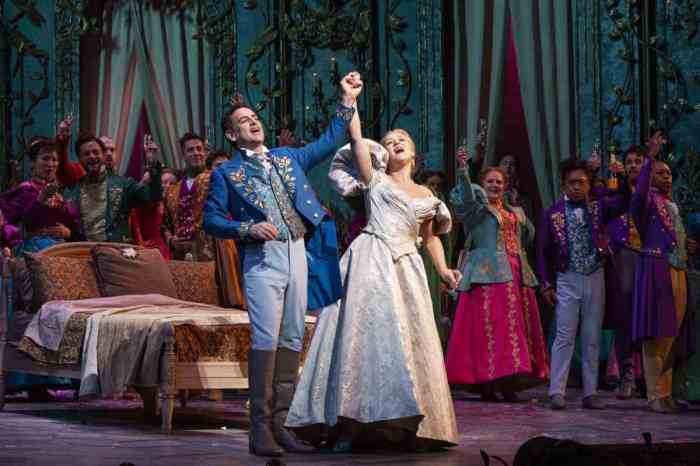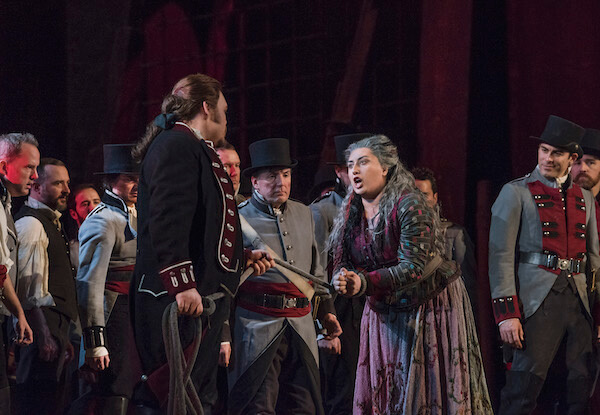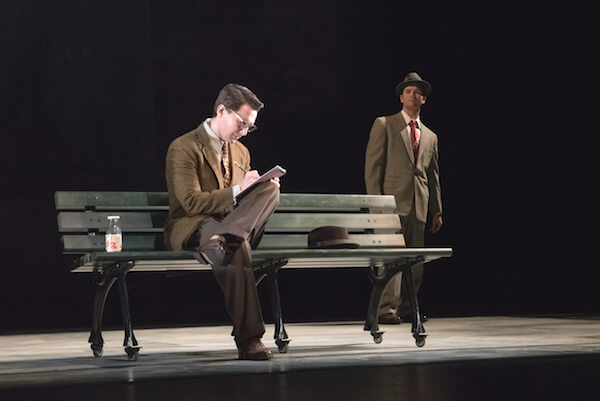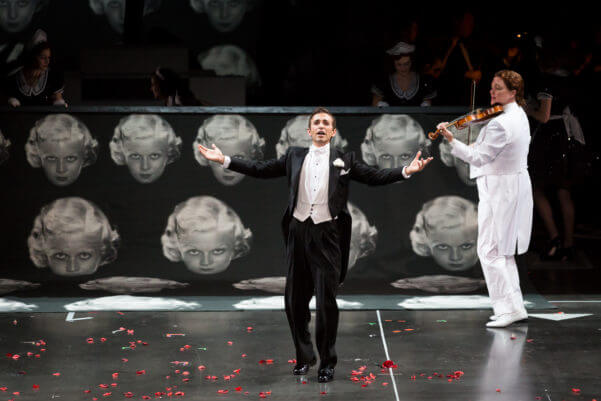Alan Opie and Jesse Kovarsky in John Adams’ “The Death of Klinghoffer,” which opened at the Met to angry protests on October 20. | KEN HOWARD/ METROPOLITAN OPERA
Approaching Lincoln Center Plaza for the October 20 Metropolitan Opera premiere of John Adams’ “The Death of Klinghoffer,” I felt I was entering a war zone. The park across from the plaza resounded with demonstrators’ speeches — including one from former Mayor Rudolph Giuliani — denouncing the opera as anti-Semitic and pro-terrorist. Stanchions and police tape cordoned off the plaza, and I was stopped and asked why I was there. Entering the opera house, I spotted police and security guards stationed in the lobby and the auditorium – in fact a plainclothes security guard was sitting next to me in the orchestra, scanning the crowd for troublemakers. There was an electric, anxious atmosphere of brewing discontent and potential conflict.
In a way, I felt like the helpless passengers of the Achille Lauro in 1985, signing up for a pleasure cruise and ending up a captive audience for a politico-religious demonstration, afraid for my personal safety. Adams’ 1991 opera dramatizes the hijacking of that Italian cruise ship by four members of the Palestine Liberation Front, who subsequently murdered a wheelchair-bound 69-year-old Jewish New Yorker, Leon Klinghoffer.
Even before conductor David Robertson lifted his baton, protesters positioned in the upper rings loudly booed. The same protesters angrily heckled the chorus of displaced Palestinians in the Prologue. During a pause in the first act, one protester chanted, “The murder of Leon Klinghoffer will never be forgiven,” until he was escorted out by security. After Act I ended, a man in a side balcony recited the Kaddish for the title character.
The Met triumphs with John Adams’ dignified, humane opera, hobbled only by Alice Goodman’s libretto
But for every boo, there were three or four retaliatory bravos from New Yorkers who wanted to make up their own mind and who valued freedom of speech in the arts and in public discourse. By Act II, most of the protesters had either left or had shot their wad. The horrifying anti-Semitic rant sung by the terrorist character known as “Rambo” passed by in silence — even the most prejudiced audience member could hear in the stabbing bass chords that Adams was depicting blind hatred and evil. At the final bows, a standing ovation and loud cheers silenced those who booed and cried, “If this is art, it is shitty art!”
Was this “shitty art”? Is this opera anti-Semitic? No, emphatically no. This production of “Klinghoffer” affirmed the Met’s status as one of the world’s greatest opera companies. I was riveted and involved from beginning to end.
John Adams’ oratorio-like structure utilizes reflective extended choral sections, anguished solo narratives, and brief dramatic episodes evoking the Bach passions and Handel’s biblical oratorios. But rather than present only the Judeo-Christian viewpoint, the composer and librettist accord the Arab extremists and the Israeli and Western characters their own personalized voice. However, while Adam’s music gives equal depth, dignity, and humanity to every character, Alice Goodman’s libretto is disturbingly unbalanced and tone deaf.
Take the opening choruses of exiled Palestinians and Israelis: The Palestinians sing of their lost homeland in nostalgic phrases reminiscent of Verdi’s “Va Pensiero” chorus of exiled Jews in “Nabucco”: “My father’s house was razed/ In nineteen forty-eight/ When the Israelis passed/ Over our street…. I see in my mind’s eye/ A crescent moon./ Of that house, not a wall/ In which a bird might nest/ Was left to stand. / Israel laid all to waste.” (Originally this was followed by a scene depicting the Rumors, a Jewish family in Brooklyn, who bicker over bargain sales, food prices, and trivia — this was permanently excised a year later.) In the current text, the exiled Israelis follow the Palestinians singing: “When I paid off the taxi, I had no money left, and, of course, no luggage. My empty hands shall signify this passion, which itself remembers.”
Like most of the words Goodman puts into the mouths of the non-Arab characters, banal self-absorption and petty obsessions over material goods overshadow any sense of social responsibility or personal insight. If Goodman is attempting ironic commentary or social criticism, this is lost on Adams — the music for both groups has equal seriousness and weight.
The hijacker Mamoud, beautifully performed by baritone Aubrey Allicock in his Met debut, sings a lyrical aria describing the migration of birds above the earth that is a vocal and musical highlight. But a feisty older Austrian tourist who barricades herself in her stateroom natters on about rationing the contents of her fruit basket. She concludes: “I prayed and sweated through the worst/ Even if one were going to die/ One would avoid the company/ Of idiots. During the war/ I felt the same.” She equates the Palestinian terrorists with World War II’s Allied troops.
In Act II, a British dancing girl vapidly chatters about how the hijacker Omar slipped her cigarettes and how the bread was buttered on the wrong side. This is followed by a lyrical incantatory aria by a Palestinian woman, beautifully sung by mezzo Maya Lahyani, evoking the misery of life and inciting Omar, who is the youngest of the terrorists, to embrace martyrdom: “May we be worth the pains of death/ And not grow old/ In the world/ Like these Jews./ My soul is/ All violence./ My heart will break/ If I do not walk/ In Paradise.”
The seductions of religious extremism and political terrorism are evoked in ironically beautiful poetic imagery and hypnotic melody. Immediately after this, Omar shoots Leon Klinghoffer, leaving his bleeding corpse facing the audience in his wheelchair. The extremist Islamic view is given musical and poetic weight and purpose; in comparison, the humane Western view seems shortchanged. Both views are left open to misinterpretation. What we see, the sense of the text, and what we hear are full of internal dissonance.
I suspect that Goodman doesn’t know how Palestinians really think and talk, so she bestows on them a poetic diction that is too often rhetorical, abstruse, and pretentious. She patronizes the Western characters and Israelis. The exceptions are the philosophical ship’s captain, who is the moral conscience of the piece, and the Klinghoffers themselves. Leon, who is largely silent in Act I, defiantly confronts the terrorists: “We’re human, We are/ the kind of people/ you like to kill.”
The strengths and failures of the composer and librettist come to the fore in the final solo arias for Leon and Marilyn Klinghoffer. After his corpse is tossed overboard, the post-mortem Klinghoffer sings “The Aria of the Falling Body.” Goodman’s text invokes imagery of good furniture exposed to the rain and souvenirs looted from bureau drawers. Adams’ music transcends Goodman’s pointless words, going right to the heart — descending triads and shifting tonalities seeming to pull Klinghoffer into the oceanic depths of human loss, a netherworld inhabited by the victims of man’s inhumanity to man.
In contrast, the personal becomes universal in Marilyn Klinghoffer’s searing final lament for her dead husband; here, the words and music come together directly and powerfully. Michaela Martens’ mezzo-contralto voice digs into the suffering common to all victims of political and religious violence, giving this dying Jewish woman the final word.
Tom Morris’ (“War Horse”) fluid, admirably direct production takes a documentary approach, using projected films, photographs, and text to fill in the background. The action scenes aim for cinematic realism, but become more stylized in the extended choral episodes, which utilize dance and mass movement.
The entire cast — led by Martens and Alan Opie as the Klinghoffers, Paulo Szot as the agonized Captain, and Allicock, Sean Panikkar, Ryan Speedo Green, and dancer Jesse Kovarsky as the hijackers — are unified in their deep commitment, telling this story with emotional truth.
Conductor David Robertson led the magnificent Met orchestra and chorus, who perform their huge and varied duties with wholehearted passion. Peter Gelb’s firm advocacy of the work despite public criticism is fully vindicated.
Ten years after “Klinghoffer” premiered, Islamic terrorism traveled to New York City, changing our landscape — physical, political, and psychological — forever. One of the New York landmarks targeted for attack by Al-Qaeda was the Metropolitan Opera House itself. Working 100 yards from the World Trade Center, I witnessed the events of September 11 and had tickets for an opera at Lincoln Center that night. The heightened security at the “Klinghoffer” premiere reminded me of the fears of that time but also how the country has changed in the intervening 13 years. Alice Goodman’s libretto seems stuck in simplistic, politically naive attitudes from the last century while John Adams’ music speaks to us now with greater urgency than ever. Its message should be heard.



































